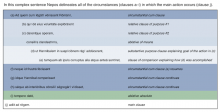Nepos flashes forward to Hannibal’s arrival in the court of Antiochus the Great, after his exile from Carthage in 195 BC (1). Hannibal proves his loyalty to Antiochus by recounting how he swore an oath of eternal hatred against Rome before his father allowed him to join the army (2–5). Having finished the story of his oath, Hannibal exhorts Antiochus to spurn an alliance with Rome and to offer him command of Antiochus’ forces (6).
(1) nam: this conjunction indicates that this sentence will justify or explain the last statement (AG §324h).
ut omittam: a common idiom, favored by Nepos' contemporary Cicero, "if I may pass over…" → "not to mention," "to say nothing of."
Philippum: King Philip V of Macedon (reigned 221–179 BC). After forging an alliance with Hannibal, Philip launched the First Macedonian War (214–205 BC). Hannibal, after his crushing victory at the Battle of Cannae (below, 4.4), enticed many cities of southern Italy and Sicily to revolt. Hannibal also received an embassy from Philip, who proposed an alliance against Rome. Although Philip possessed significant military resources, Rome’s control of the sea prevented Philip and Hannibal from joining forces in Italy. After Philip had occupied large sections of Illyria in 212, the Romans attempted to neutralize Philip through diplomacy. But after Philip defeated an anti-Macedonian coalition of Greek states and prevented a Roman expeditionary force from retaking Illyria, Rome negotiated a separate peace in 205. The treaty recognized Philip’s territorial gains in Illyria, but Rome had won a more significant strategic victory by severing the alliance between Philip and Hannibal. And Rome had a long memory. Philip’s reckoning would come almost a decade later when Rome crushed the Macedonians at the Battle of Cynocephalae in 197 BC, thus concluding the Second Macedonian War (200–197/6 BC). After the defeat, Philip was stripped of his independence, although he was allowed to remain on his throne. [image: coin depicting Philip V]
absēns: describes Hannibal; i.e., Hannibal sent an embassy that forged the anti-Roman alliance with Philip.
hostem: i.e. Philip, in apposition with the relative pronoun, quem.
omnium iīs temporibus potentissimus rēx: omnium is a partitive genitive limiting potentissimus (AG §346).
Antiochus: King Antiochus III (the Great) of the Seleucid Kingdom (reigned 222–187 BC). Hannibal would flee to Antiochus’ court in 195 BC (see 7.6-8.4) [map: Hannibal's travels to the east] [Image: coin depicting Antiochus III].
hunc: Antiochus; Hannibal is the subject of incendit.
tantā cupiditāte: tantā signals the result clause, ut…cōnātus sit inferre.
bellandī: objective genitive, "for waging war" (AG §347); bellandī appears after the verb, incendit, for the sake of stylistic variety. Despite the tendency in Latin for the verb to come at the end of a sentence, authors routinely place a word or closely connected phrase after the verb to avoid monotony (AG §596a). Note that Italiae follows cōnātus sit inferre in the next clause. The same variation can be found in the next sentence with Rōmānī, operam, and ad rēgem.
ūsque ā rubrō marī: "all the way from the Red Sea." To the Romans, the Mare Rubrum (more frequently the Mare Erythraeum) referred to all of the waters around the Arabian Peninsula.
Italiae: dative with the compound verb, inferre (AG §370).
Roman legates attempt to undermine Hannibal’s position in Antiochus’ court.
(2) In this, the most complex sentence in the Life, Nepos first delineates the circumstances in which the main action occurs (clauses a–i) before at last revealing the main action (clause j). [color-coded schematic of sentence structure].
|
(a) Ad quem cum lēgātī vēnissent Rōmānī,
|
circumstantial cum clause
|
|
(b) quī dē ēius voluntāte explōrārent
|
relative clause of purpose #1
|
|
(c) darentque operam,
|
relative clause of purpose #2
|
|
cōnsiliīs clandestīnīs,
|
ablative of means
|
|
(d) ut Hannibalem in suspīciōnem rēgī addūcerent,
|
substantive purpose clause
explaining goal of action in (c)
|
|
(e) tamquam ab ipsīs corruptus alia atque anteā sentīret
|
clause of comparison explaining how (d) was accomplished
|
|
(f) neque id frūstrā fēcissent
|
circumstantial cum clause (a) resumes
|
|
(g) idque Hannibal comperisset
|
circumstantial cum clause continues
|
|
(h) sēque ab interiōribus cōnsiliīs sēgregārī vīdisset,
|
circumstantial cum clause continues
|
|
(i) tempore datō
|
ablative absolute or ablative of time
|
|
(j) adiit ad rēgem.
|
main clause
|
This sentence provides an excellent example of the Latin Period, the lengthy but logically coherent sentence structure that was favored by most Latin prose authors.
(a) Ad quem cum lēgātī vēnissent Rōmānī: circumstantial cum clause describing an action that precedes the action of the main verb (AG §546). The lēgātī Rōmānī, led by Publius Villius Tappulus, arrived in Antiochus’ court in 193/2 BC.
Ad quem: i.e., King Antiochus. The connective relative links a sentence with an aspect of the preceding sentence (AG §308f). It is a device much favored by Nepos. Positioning a key word or phrase before the subordinating conjunction (cum) is very common in Latin.
vēnissent: pluperfect subjunctive in secondary sequence indicating the action occurred before the perfect main verb adiit, likewise the verbs fēcissent (in clause f), comperisset (g), and vīdisset (h).
(b) quī dē ēius voluntāte explōrārent: relative clause of purpose expressing the reason that the lēgātī vēnissent (AG §531), "in order to gain information about his [i.e., Antiochus’] intentions." explōrārent: imperfect subjunctive in secondary sequence indicating that the action happened at the same time that the lēgātī vēnissent Rōmānī.
(c) darentque operam…ut: "and they endeavored to." The –que links the entire clause to the preceding thought.
cōnsiliīs clandestīnīs: ablative of means explaining how the lēgātī darent operam.
(d) ut…addūcerent: expresses the purpose towards which the lēgātī Rōmānī aimed when they darent operam (AG §563). addūcerent: frequently takes an accusative (Hannibalem) and a prepositional phrase denoting the place or state into which the accusative was led (in suspīciōnem).
rēgī: dative of reference denoting the person for whose benefit the action was accomplished, "in the eyes of the king" (AG §376).
(e) tamquam ab ipsīs corruptus alia atque anteā sentīret: the Rōmānī lēgātī pretend that Hannibal is corruptus.
tamquam: "as if…."
ab ipsīs: ablative of personal agent with corruptus; ipsīs, i.e. lēgātīs Rōmānīs.
alia atque anteā: idiomatic, "differently than before," object of sentīret, whose subject is Hannibal.
(f) neque id frūstrā fēcissent: the tense of fēcissent signals that the circumstantial cum clause has resumed. The circumstantial cum clauses continue in clause g (comperisset) and clause h (vīdisset).
(g) comperisset: note the shift in number from plural to singular as Nepos shifts to recounting Hannibal's actions.
(h) ab interiōribus cōnsiliīs: "more intimate councils," i.e., the King’s inner circle of advisors.
(i) tempore datō: ablative absolute or ablative of time when, "when the opportunity presented itself" (to Hannibal).
(j) adiit ad rēgem: note how Nepos echoes the prefix of the verb (ad–) in the preposition (ad). Roman authors often favor wordplay that we avoid in formal writing (e.g. 2.4, 5.3, etc.).
(3) eīque cum multa…commemorāsset: circumstantial cum clause (AG §546; as in 2.2 above). The subordinating conjunction (cum) is displaced from the start of its clause by a key word (the connective, eī). eīque: i.e., Antiochus; dative with commemorā(vi)sset, syncopated pluperfect subjunctive. multa: object of commemorāsset.
odiō: like fidē, an object of the preposition dē.
in Rōmānōs: "towards the Romans," "against the Romans."
puerulō mē: ablative absolute; since Latin lacks the present or perfect participle of esse, an ablative absolute can consist of a noun and adjective or two nouns in the ablative, as here (AG §419a; 7.2, 9.3, 12.2); puerulō: the diminutive of puer ➝ "a little boy."
utpote nōn amplius novem annōs nātō: further specifies what Hannibal means by puerulō mē, i.e. nōn amplius novem annīs. nātō: agrees with mē; "not being more than 9 years old," thus in 238/7 BC.
Karthāgine: locative, "in Carthage."
Iovī optimō maximō: "to Jupiter Optimus Maximus," the supreme Roman god. Nepos follows the Roman practice of using the name of the analogous Roman god in place of the Carthaginian deity, Baal.
(4) quae: connective relatives are often translated by "and" + the demonstrative, e.g., "and this…." Here, with dum, "and while this…."
vellemne: = vellem–ne, subjunctive in an indirect question introduced by quaesīvit ā mē.
in castra: metonymic for "on campaign."
id: i.e., the question that Hamilcar had asked (vellemne sēcum in castra proficiscī). accēpissem: as with English "accept," accipiō can denote the acceptance of a condition. ab eō: "from him" (Hamilcar), with petere.
nē dubitāret: negative substantive purpose clause dependent on petere (AG §563, sometimes called a jussive noun clause; 7.2, 8.1); dubitō + infinitive (dūcere; 11.3) often has the sense of "hesitate" (AG §558a n.2), "that he would not hesitate."
dūcere [mē]: Remember that Hannibal is telling this anecdote.
eam: the altar (aram); object of tenentem. It was customary to touch an altar when swearing an oath.
cēterīs remōtīs: ablative absolute; i.e., Hamilcar and Hannibal are alone.
numquam mē in amīcitiā cum Rōmānīs fore: an indirect statement indicating what Hannibal swore (iūrāre). numquam: placed first and separated from the verb fore for added emphasis.
in amīcitiā: amīcitia in this context referred to a person or state that has placed itself in a subordinate but still independent relationship with Rome. Nepos’ account of this episode is similar to that offered by Polybius (“never have good will towards the Romans," 3.11.7). Livy says that Hannibal instead swore “to be an enemy of the Roman people as soon as he was able” (21.1).
fore: = futūrum esse.
(5) id ego: unemphatic personal pronouns (ego) appear second in Latin clauses, even if doing so interrupts another phrase or clause (id…iūs iūrandum). This is an example of Wackernagel's Law, which says the certain words tend to appear in the second position of a clause across all Indo-European languages.
iūs iūrandum: a formal oath to complete a civil, military, or political obligation, sworn in the presence of a higher power—usually Jupiter or all the gods—but here to Hamilcar (patrī datum). Hannibal’s odium is thus characterized not as a personal grudge but as a sacred (and public) obligation. [Images: Cicak, Hannibal's oath; Schönfeld, Hannibal's oath; Amigoni, Hannibal's oath; Leech, Hannibal's oath]
ūsque ad hanc aetātem: compare ūsque ā rubrō marī in 2.1.
ita cōnservāvī: ita signals the result clause, ut…dēbeat.
nēminī: dative of reference, "in the opinion of no one."
quīn…sim futūrus: "that I will be…"; quīn often introduces subjunctive clauses after negated expressions of hindering, resisting, and doubting (nēminī dubium esse, AG §558).
reliquō tempore: ablative of time, "for the rest (of my life)."
eādem mente: ablative of quality (AG §415), "of the same mind."
(6) Hannibal's speech concludes with a carefully structured sentence in which Hannibal warns Antiochus that the nature of their relationship rests on whether Antiochus intends to make peace with the Romans (sī quid amīcē dē Rōmānīs cōgitābis) or to wage war against them (cum quidem bellum parābis). To avoid confusion from the accumulation of conditionals, each half of the sentence is comprised of three parallel elements: 1) a general parameter (peace vs. war); 2) the result of Antiochus’ action (act wisely vs. act foolishly); and 3) Antiochus’ action (keep Hannibal in ignorance vs. not make him general). [schematic of sentence structure].
sī quid: = sī (ali)quid: remember that after sī, nisi, num, and nē every ali– falls away.
amīcē: adverbial; i.e., if Antiochus entertains an alliance with Rome.
fēceris: future perfect tense, giving added emphasis to the future more vivid conditional, as do cēlāris and posueris (AG §516c).
nōn imprūdenter: "not unwisely." An example of litotes, in which an understatement or double negative implies the opposite, → "very wisely."
mē cēlā(ve)ris: syncopated future perfect with an ablative of separation, "hide [it] from me."
quidem: introduces a clause that confirms ("indeed," "truly") or, as here, qualifies the preceding thought ("yet," "on the other hand").
in eō: "in this matter," referring to the action of the clause, cum quidem bellum parābis.
prīncipem: in apposition with mē, "me as leader."







